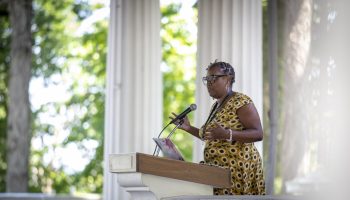This year’s Chautauqua Writers’ Festival offered its students a chance to explore — both with their writing and on the grounds.
“We tried to take advantage even more of the many unique and inspiring nooks and crannies that make Chautauqua such an amazing place,” said co-director Lori Jakiela. “We scheduled events in buildings across the grounds to allow participants to take in the space as a whole.”
Jakiela, along with her co-directors Phil Terman and Sherrie Flick, were in charge of curating the Writers’ Festival, now in its 14th year. The festival is co-sponsored by Clarion University; Penn State Erie, The Behrend College; University of North Carolina at Wilmington; University of Pittsburgh at Greensburg; and Monmouth University.
From June 15 to June 18, Jakiela, Flick and Terman welcomed a group of eight faculty members and a host of student writers. Emily Carpenter, education department coordinator, who helps oversee the festival, said this year’s event had 60 student participants.
This year’s faculty included Ann Pancake and Stewart O’Nan for fiction, Diana Hume George and Beth Ann Fennelly for creative nonfiction, Lia Purpura and Marcus Wicker for poetry, and Scott Minar and Bruce Dalzell for songwriting.
Fiction, creative nonfiction and poetry are all standard genres taught during the Writers’ Festival, but this year saw an expansion of the songwriting sessions, Terman said.
“We bring to the festival the songwriters and teachers Scott Minar and Bruce Dalzell, who instruct students in the songwriting process,” Terman said. “As part of the songwriting component, they brought in a major singer-songwriter, Kim Richey, to perform and instruct.”
Terman said the faculty and students loved Richey’s presence and performances, which Jakiela echoed.
“Kim Richey, our musical guest, is an absolute rock star,” Jakiela said. “Her performance in Fletcher (Music Hall) was so moving, and she participated in our nightly hoots, too.”
Those “hoots” are the nightly hootenannies, musical gatherings that bring the faculty and staff together.
This sense of camaraderie also spills over into the planning of the festival, which Jakiela said is always rewarding. She said Terman and Flick are “dreamboats.”
“Sherrie likes to say, ‘Go team!’ a lot, and that’s what we are,” Jakiela said. “Phil and Sherrie are such good spirits — we work hard together, but we laugh a lot and always remind each other to take a moment to look around and appreciate the beauty of Chautauqua and the festival experience. Working with them enriches me.”
Terman agreed, saying he couldn’t ask for a better pair of writers to work with when planning the festival.
“Their philosophy gels perfectly with mine — developing a community of writers that is nonthreatening, engaging and joyful,” Terman said.
Jakiela enjoys the classes, panels and get-togethers that allow the students and faculty to interact, but she said a smaller moment struck her this year as especially meaningful. One of the students was a veteran of Iraq and Afghanistan, who Jakiela said met an older veteran who had been in Berlin in the 1960s. The two forged an unforgettable connection.
“They spent a long time talking with each other on a bench outside the Pier Building,” Jakiela said. “They shared stories they couldn’t share with anyone else. Later my student told me he found his soul, right there on that bench overlooking the lake. The way the festival brings people together like that, the magic of this place — that’s my favorite thing every time.”
Both Jakiela and Terman said they’re looking at ways to expand the Writers’ Festival for next year, particularly with the focus on literary arts at the beginning of the 2018 season. Week One’s theme in 2018 will be “For Love of the Written Word.”
Terman said the discussions so far have been preliminary, but exciting nonetheless. Jakiela said they’ll be finding ways to help the festival participants stay on through the beginning of the season. The Writers’ Festival is held in the pre-season, so Jakiela, Terman and Flick have been thinking about how to merge the two in some capacity.
“This is especially wonderful because every year, during the last day of the festival, people tell us they don’t want to leave,” Jakiela said. “They want more and we’re excited to be able to offer just that.”




